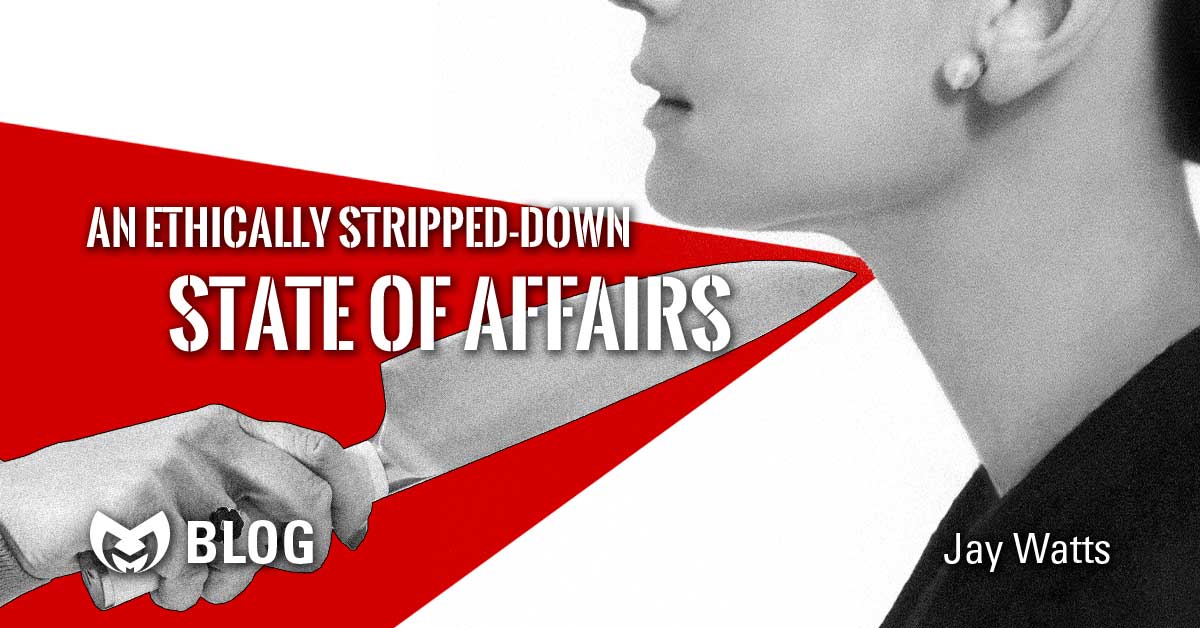Imagine our hero wakes up one morning and everything about the way we live our lives is suddenly mysterious. Every understanding of social contracts, personal rights, community responsibilities, etc., slipped from his mind as he slept. He launches into the world with the whole of human relationships existing as a country to be newly discovered.
In this new ethically stripped-down state of affairs, the first time our hero’s wanderings bring him into contact with another human soul raises questions never considered. They talk to him as any normal person would, but his mind races. What do I do? What am I allowed to do? If I continue to grow weary of their stories, do I politely listen, or do I punch them in the face and run? What does it mean to be polite anyway? He hardly hears a word as he internally navigates this new thing, human relationships.
How do I treat others?
I humbly suggest that something like this happens all day every day whether we are consciously aware of it or not. We come across fellow travelers to the grave and are thrust into navigating how we should and how we should not treat them. What actions are permissible, and more importantly what actions absolutely ought never be done to another human being? Circumstances can make those questions exceedingly difficult to both fully articulate morally and fully agree upon as a community, but one thing ought to be immediately obvious. When we meet another human being, we OUGHT NOT to kill them. We have a basic duty to refrain from ending their lives without the most extreme justification. On its face, at first consideration, we owe others a negative duty to refrain from lethal action. In fancy terms, it is prima facie wrong to kill any member of the human family.
I’ve asked thousands of people around the United States and the world a simple question. Would it be objectively wrong for you to kill me or for me to kill you right now? Almost every single one of them answered that question in the affirmative. Yes, it would be objective wrong for us to kill each other. We meet every other human being with an initial and simple understanding, an intuition. It is wrong for us to kill each other. As I once heard JP Moreland describe it, this intuition is the way the world first presents itself to us. We may not know why it is the case that it would be wrong to kill each other, but that it is the case is more obvious to us than almost anything else. In fact, it is so obvious that if another human being doesn’t understand this simple fact of human relationships, we describe them as disordered.
Not everyone believes that this intuition indicates that it is actually wrong to kill each other. I have had a couple of people say they do not believe in the existence of objective moral values, duties, and accountability. They represent a tiny minority of the people I’ve talked to, but they do exist. For the moment we’ll set their view aside and deal with the most often encountered understanding of the world. There are things that we can do to other human beings that are wrong. Not wrong for you but ok for me. Not wrong for modern Americans but ok for Ancient Egyptians. Not wrong for Christians but ok for atheists or Muslims. These are behaviors that are wrong for all people in all cultures under all earthly governments at all times. Big W wrong. The top of that list includes killing each other for no reason.
Our first duty to others
Here, then, is the beginning of things. We move through our world encountering other human beings. Most of us agree that when we encounter each other we ought not to kill each other without a really good reason. This is the first duty governing all further duties to one another. We must respect our mutual right to life.
Now imagine our hero walks with our new talkative friend from the beginning of this post encountering human beings of all sizes, races, and nationalities. With each encounter they both agree, whatever obvious differences present themselves, every human being we meet falls into the category of members of the human family.
Is the unborn one of us?
Then they meet a woman on the way to get an abortion. Our new friend very sympathetically and kindly affirms her in her decision. He understands the stresses pressing upon her, driving her to make this decision. Our hero, on the other hand, has been scrubbed of previously held presuppositions. All he seems to understand is the inside this young woman is a growing human life. This location is new to our hero’s human encounters, but a question gnaws at his conscience. He wants to affirm her, wants to express the same sympathetic support, but the question bubbles up from inside of him. “Wait a minute. You and I have walked all over this city meeting human beings and every single time we agree that we have a basic duty to all we meet. We should not kill them. That is the first duty we have to all other human beings. What is this human life that you deny it the basic obligations you acknowledge to all others? Why do you restrict your behavior to all other human beings, but not this one? What is the unborn?”
And here we have arrived at the central question to the abortion debate. As Greg Koukl and Scott Klusendorf have repeatedly taught, the moral question of abortion can only be determined by how we answer one question. What is the unborn? Are they one of us or not? All the other apparent disagreements we engage on this issue are most often not true disagreements. We agree on all of the important questions prior to this one. Do objective moral values exist? Almost everyone I have ever asked answered that question, yes. Would us killing each other, or any other innocent human being, fall into the category of objective moral wrongs? Again, almost everyone I have ever talked to agrees on this point as well. So, what is our genuine disagreement?
I wager our jolly loquacious friend doesn’t hate children or want babies to die. However much he may think any number of other things influence his sympathies, at the end of the day he simply doesn’t believe the unborn are one of us. If they were one of us, he would never endorse killing them for reasons of privacy, economic advantage, education opportunities, etc. Those issues matter, but not even our new friend would believe those issues justify killing any of the other human beings you encountered together that day. He affirms this woman’s right to abortion because the two of you disagree about how to answer the most important question. What is the unborn? Is the unborn one of us?
Then that is the question we must focus on above all others.



Leave A Comment